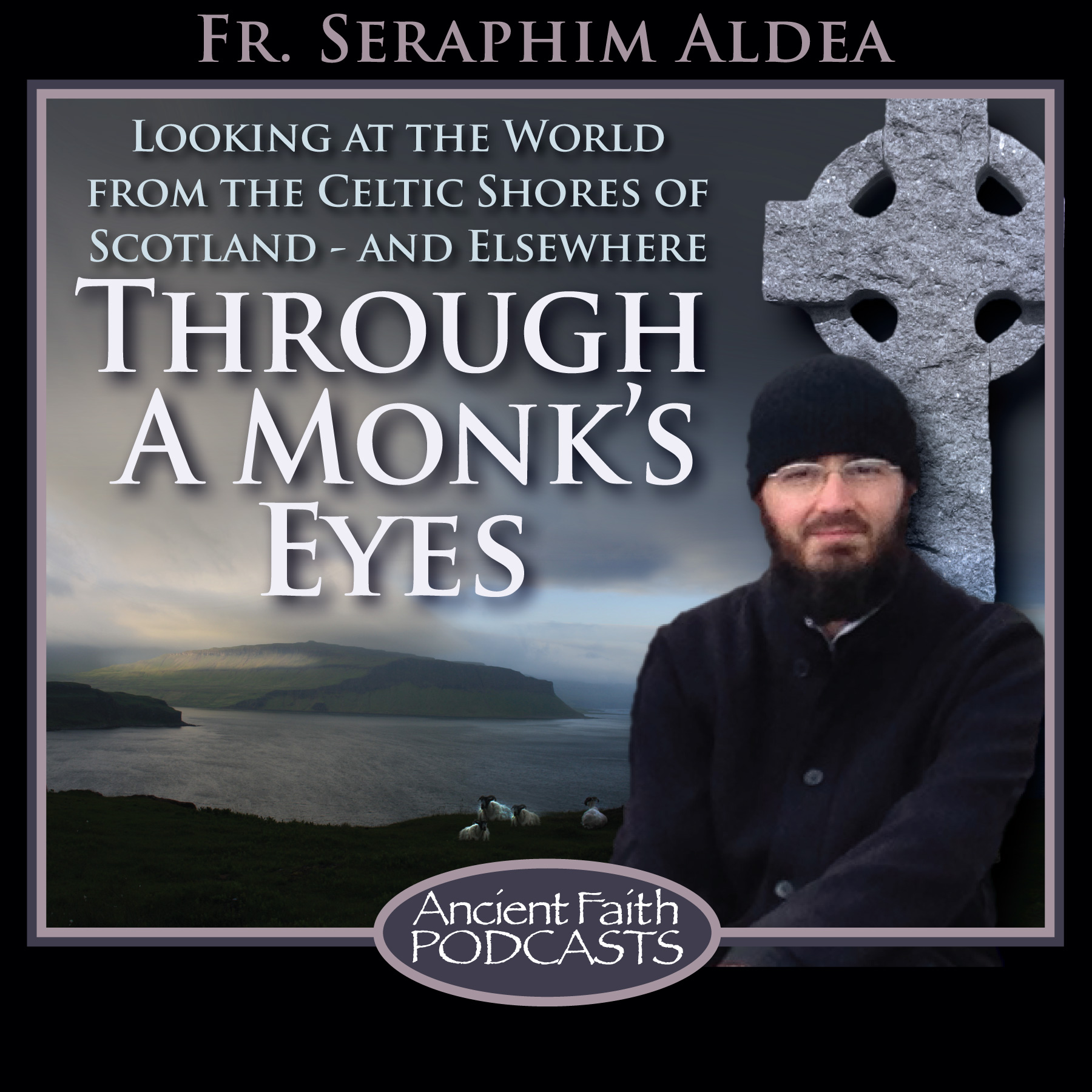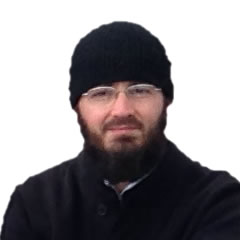Through a Monk's Eyes
On Monasticism: Part 1
Fr. Seraphim introduces his new podcast and explains why he decided to become a monk.
Thursday, May 14, 2015
Listen now DownloadSupport podcasts like this and more!
Donate NowTranscript
May 14, 2015, 8:45 p.m.
In the name of the Father, the Son, and the Holy Spirit. Amen. Well, I’d better start recording these, because if I don’t do it now, I probably will never do it. These podcasts have been in the making for six months now. I have this horrible habit of just postponing things, because I am afraid nothing I have to share with you is useful or relevant in any way, but the reality is that ten years after I started my monastic life should have taught me by now that being useful or relevant has nothing to do with what I can offer you. It’s entirely up to our God [who] knows what you need. He simply works through me, regardless of my own abilities. So here it goes.
I’m a great believer in doing things rather than just speaking or talking about doing things. Sometimes in life, things we try work out, and other things simply don’t. That is absolutely normal, absolutely all right, and we should simply accept it. Sometimes we learn humility; other times we given glory to God for things that have worked out.
Just as a means of introduction, my name is Seraphim. I am a hieromonk, and the reason for this series of podcasts is very simple, actually. I am working to found an Orthodox monastery on the Isle of Mull in the Hebrides, the old Celtic Isles to the west of Scotland. It has become entirely clear to me that God does not want me to do this alone. I can’t do it alone. I need your support. In order for you to help me found this monastery, you have the right to know who I am and in some way to simply have a feeling of what I stand for and what my beliefs and values are. This is the first monastery, the first Orthodox monastery, in the Celtic isles in over a thousand years now, so it really is an important historical thing to happen. But, like so many things concerning Christ, he just doesn’t want to this to be done by one person. He wants it to be done in love as the result of a community, working together, sacrificing together, praying together.
It’s very simple. It is for this reason that I’m starting this series of podcasts. There are other things concerning my life that may be worthy of importance, things like my studies and what I’m doing right now, but I assume in time, as I become a bit more confident doing this, and as you get to know me, I shall address those questions, too.
The most important first question I get when people meet me—and not only in America, but also in England, where I live—is: Why have I become a monk? So I try to answer that today, just to get it out of the way. I have learned along the years to come up with a series of either very cold and distant answers or some smart ones, depending who’s asking me the question, but the reality, the very simple truth, is that the only honest answer is that I had no choice. You know when you read in the psalter how the prophet speaks that God chooses us from the wombs of our mothers, that’s how I’ve grown to see my own life. I had no choice but to become a monk, simply because, in some strange way, I was a monastic from the womb of my mother. It simply took me a while to recognize who I am.
It took me a while to put a name to what I am, but the values and the principles of a monastic life have always been part of me, even when I was living a life that went entirely against these values. I’m sure you all can identify with this. We all go through periods in our lives when what we do and how we behave has very little to do with the things we actually cherish and the values we actually hold. There are years in our lives when there are almost two people living in each of us, at least two people, but once those years have become history, once I’ve survived those years, it became very clear that what I am is a monastic, and that the values I believe in are those of a monastic.
To me, being a monk can be reduced to being alone. There are all sorts of other ways to understand monasticism, and I will probably get into them in the future, but the simplest, basic understanding, the one that I always get back to, is being alone, with God, for God, preparing to meet God. All those words in the Scripture about being alone, about going into the mountains to pray, about leaving one’s friends and disciples behind so Christ can pray by himself, all those tiny descriptions in St. Luke about the mother of God hearing things and just holding them, putting them into her heart but not saying anything on the outside—all these things have always spoken to me.
To be a monk is to be alone before anything else. To live a monastic life is to be dead and buried before anything else. I remember all those stories from the lives of the Desert Fathers, all that beautiful advice concerning living your life as if you were dead, and those were the things that spoke to me; those were the things that made the greatest impression on my life.
Being alone doesn’t always mean having no one around you, just as being silent doesn’t always mean not speaking. One can be alone, surrounded by a whole nation, and in the history of all Christian Orthodox countries, there are countless examples of elders who have lived surrounded by thousands and thousands of people every day of their lives, and yet they managed, through the grace of God, to preserve their aloneness, their silence.
I wouldn’t want to go too much into this now, in the first podcast, but I want you to keep this in mind as you listen to this series. I do not want to be surrounded by people, but Christ has called me to do it, and I do not want to speak to people, and yet, here I am, going every week in a different parish and meeting different people and truly praying for them and truly asking God to intercede for them and to have mercy on them.
And I’m sure you know that when you truly pray for someone, even when you’ve never met that person before and you shall never see him or her again, when you truly pray of love and mercy, then somehow that person becomes part of you. It’s almost as if your flesh opens up and your heart can just see the heart of the other person. There’s an intimacy which prayer imposes on you. I have to go through this despite my calling to live alone, because this is what Christ wants me to do. So if I sometimes seem grumpy or not in the mood to speak, or well, unfriendly, please forgive me and remember that this is a deeply unnatural thing for me to be doing and that I am only doing it because Christ asks me to do [it].
I’ll just give you a piece of advice concerning practical behavior when you meet other monastics, at the end of this first podcast. It’s something I’ve had to go through many times, and maybe people simply don’t understand the real differences between monastics and laypeople, and that’s why they do certain things when they meet us. The first basic piece of advice would be: Don’t ask a monk about their intimate life of prayer. Don’t go there, because that is the sure way for them to close their hearts. It’s a huge temptation that you’re putting them through, because the intimate, closed-in, secret, hidden things of the heart are to be kept in the heart, between you and Christ, until Christ asks you to speak about them, not until another human being does so. So that’s the first rule: Never ask anything personal or private.
The second is: Try not to be physical in your relationship or discussions with a monastic. It doesn’t matter if we’re talking about a monk or a nun; there’s no difference whatsoever. Just try to abstain from touching their hands or hugging them or caressing their hair. One of the most frequent horrible things that have happened to me, at least in America, is that people seem to want to push their children in your face, and I understand it: they want you to pray for them, they want you to bless them, but I can do that without having to hold them in my arms. I can do that without me having to play with them. Being asked to hold a child is just as tough—or can be just as difficult—for a monastic as being touched by someone of a different gender, because we still live in this flesh and the temptation of a family, the temptation of having your own children, is just as difficult to fight, if not even more difficult, than the temptation for physical attraction to someone else. I don’t know why, when I went into this, but I assume it’s a way of introducing myself. This is who I am; this is my name, and when we meet, this is how I would very much appreciate it if you behaved.
Well, until next week, I would be praying that God enlightens me what to tell you. Please pray for me as well. Pray for Seraphim, and pray for the monastery of All Celtic Saints on the Isle of Mull. If you have any question that you would like me to answer, if you have any topic you would like me to address, just send me an email. And if I feel I have anything relevant to say, I shall. Just please, don’t ask anything theological, anything doctrinal, anything controversial. I will just not address those questions, because there are so many other, better-prepared people doing these sort of podcasts who can answer those questions. I simply am not interested in deep theological controversial issues.
Ask the things that truly matter to you. Ask the basic, simple things that help you stand in front of God or tear you down in front of God. Ask the things that truly matter, and if you do that, then the Holy Spirit will enlighten me and will give me an answer. Please forgive me. May God bless you, again and again and again and again. Amen.
About
Have you ever wondered what the world looks like through a monk’s eyes? Priest-monk Seraphim shares his stories of the places he visits and the people he meets as he travels the world to found the first Orthodox monastery in the Celtic Isles of Scotland in a thousand years. The Monastery is dedicated to All Celtic Saints, and you may support its founding at mullmonastery.com.
Contributors

 Fr. Seraphim Aldea
Fr. Seraphim Aldea